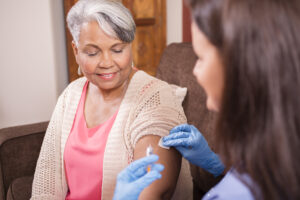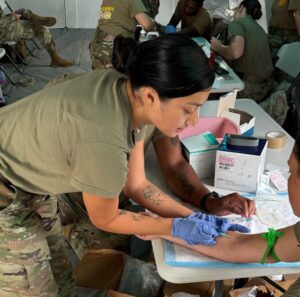Did you know that women are almost twice as likely to develop Alzheimer’s disease as men? In fact, the Alzheimer’s Association reports that women aged 65 have a 1 in 5 chance of developing the disease. In recognition of National Alzheimer’s Disease Awareness Month, we’ll discuss why more women are affected by the condition and some steps you can take to reduce your risk.
What is Alzheimer’s disease?
According to the National Institute on Aging, Alzheimer’s disease is a progressive condition that affects the brain and its functioning. In its early stages, it destroys neurons and connections in areas of the brain that are involved in memory. It moves on to affect the cerebral cortex and regions responsible for language, social behavior and reasoning. Eventually, the disease will cause an individual to gradually lose their ability to function and live independently and becomes fatal.
Alzheimer’s risk to women
Alzheimer’s disease disproportionally affects more women than men in the United States. Almost two-thirds of the approximately 6.2 million people 65+ with Alzheimer’s disease are women. In fact, women over 60 years old are twice as likely to develop Alzheimer’s as they are breast cancer.
Unfortunately, researchers have not discovered all of the causes of Alzheimer’s. However, a recent Harvard Medical School article, “Why are women more likely to develop Alzheimer’s disease?” investigates possible reasons for this disparity.
Age
One of the biggest risk factors for Alzheimer’s is age – the longer a person lives, the more their chances of contracting Alzheimer’s increase. Women tend to live longer than men and thus have a greater chance of being diagnosed.
Immune systems
Another theory is that amyloid plaques, clumps of misfolded proteins that accumulate in the brain and kill neurons, may be a part of the body’s immune response. Since women typically have stronger immune systems, they may accumulate more of these plaques than men, thus increasing their Alzheimer’s risk.
Prevention tips
Alzheimer’s researchers are still learning about what causes the disease and the best ways to reduce your risk of contracting it. However, they have identified several habits that may help reduce Alzheimer’s risk.
Diet and exercise
The Dietary Approaches to Stop Hypertension (DASH) and Mediterranean diets are two heart-healthy eating programs that scientists believe reduce Alzheimer’s risk. The DASH diet includes vegetables, fruits, fat-free or low-fat dairy, poultry, beans, seeds and vegetable oils. The Mediterranean diet includes fish, olive oil, fruits, vegetables, nuts, beans and whole grains and avoids red meats. As a bonus, these healthy eating habits will help protect you from other diseases and conditions.
Aerobic exercise, also known as cardio exercise, increases blood and oxygen flow to the brain. Thirty minutes a day of activities such as brisk walking, jogging, swimming or biking is recommended to maintain your brain health. Be sure to consult with a physician before beginning an exercise program.
Social connections
Staying mentally active and socially connected has been shown to lower the risk of cognitive decline. Reading books, completing puzzles and interacting with friends and family can help keep your mind stimulated.
Safety practices
The Alzheimer’s Association reports a strong link between head trauma and the future risk of cognitive decline, especially when the trauma involves a loss of consciousness. Taking steps like wearing a seat belt and minimizing tripping hazards and poor lighting in your home can help protect you from head trauma.
Early warning signs
The Alzheimer’s Association has compiled a helpful list of early signs and symptoms of Alzheimer’s. If you or a loved one notices any of these warning signs, schedule an appointment with your doctor.
- Memory loss that disrupts daily life
- Challenges in planning or solving problems
- Difficulty completing familiar tasks
- Confusion with time or place
- Trouble understanding visual images and spatial relationships
- New problems with words in speaking or writing
- Misplacing things and losing the ability to retrace steps
- Decreased or poor judgment
- Withdrawal from work or social activities
- Changes in mood and personality
Resources
If you are interested in learning more about Alzheimer’s disease or getting support – check out the following resources.
Alzheimer’s Association – The leading voluntary health organization in Alzheimer’s care, support and research.
National Institute on Aging Alzheimer’s and Related Dementias Education and Referral Center – The ADEAR Center offers information on diagnosis, treatment, patient care, caregiver needs, long-term care, and clinical trials related to Alzheimer’s disease.



